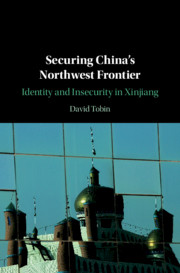Book contents
- Securing China’s Northwest Frontier
- Securing China’s Northwest Frontier
- Copyright page
- Dedication
- Contents
- Figures
- Abbreviations
- Introduction
- 1 Securing China on the Multi-Ethnic Frontier
- 2 Mass Education as an Identity-Security Practice
- 3 ‘East Turkestan’ in China’s Identity and Security Narratives
- 4 Identity and Insecurity after ‘7-5’
- 5 Performing Inclusion of the Uyghur Other
- 6 Han and Uyghur Narratives on Ethnic and National Identity
- 7 Han and Uyghur Narratives on Identity and Insecurity
- Conclusion
- Book part
- Bibliography
- Index
2 - Mass Education as an Identity-Security Practice
Published online by Cambridge University Press: 18 September 2020
- Securing China’s Northwest Frontier
- Securing China’s Northwest Frontier
- Copyright page
- Dedication
- Contents
- Figures
- Abbreviations
- Introduction
- 1 Securing China on the Multi-Ethnic Frontier
- 2 Mass Education as an Identity-Security Practice
- 3 ‘East Turkestan’ in China’s Identity and Security Narratives
- 4 Identity and Insecurity after ‘7-5’
- 5 Performing Inclusion of the Uyghur Other
- 6 Han and Uyghur Narratives on Ethnic and National Identity
- 7 Han and Uyghur Narratives on Identity and Insecurity
- Conclusion
- Book part
- Bibliography
- Index
Summary
Chapter 2 critically examines Uyghur inclusion through official Zhonghua Minzu narratives in mass education as an identity-security practice after the July 2009 violence. The chapter analyses how party-state historical narratives demarcate hierarchical boundaries between majority Han and ethnic minorities (shaoshu minzu少数民族), particularly in universal ‘ethnic unity’ (minzu tuanjie 民族团结) education. The first section shows the party-state narrates Zhonghua Minzu by unifying all peoples’ histories within China’s contemporary borders as timelessly constituted by the minzu category and hierarchical majority-minority relations. Section 2 shows how nation-building texts relationally constitute and normatively evaluate identities of the Han as a timeless, modernising “frontier-building culture” against ethnic minorities as passive, backward recipients. The final section analyses how 'bilingual education' (Mandarin-medium education) policy is presented as the means to 'fusion' and national unity within these hierarchical relations. Official texts deploy concepts of fusion (jiaorong 交融) and minzu extinction (minzu xiaowang 民族消亡) to narrate the disappearance of shaoshu minzu identities as teleological progression of Zhonghua Minzu. The chapter shows that official nation-building narratives produce a hierarchical and ethnocentric China by framing Uyghur identity as backward obstacles to China’s unity and security.
- Type
- Chapter
- Information
- Securing China's Northwest FrontierIdentity and Insecurity in Xinjiang, pp. 59 - 86Publisher: Cambridge University PressPrint publication year: 2020



